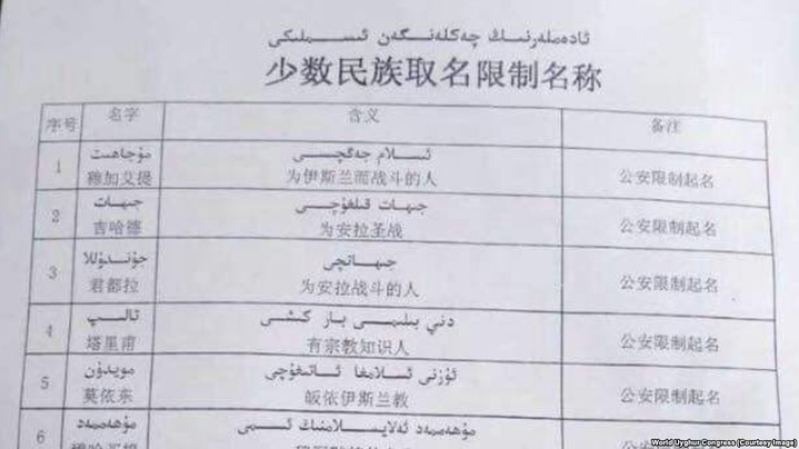
Muslim parents in China who give their children Islamic names such as "Mohammad" and "Jihad" risk forfeiting critical benefits for their children, including education and health care, according to a new law.
The New York Times reports that Chinese officials released a document titled "List of Banned Ethnic Minority Names" earlier this month. The list includes more than two dozen names, including "Arafat," "Mujahid" and "Medina," all of which are banned in an effort to "curb religious fervor" in the western region of Xinjiang - an area the government considers a "hotbed of Islamic extremism".
The document, which also lists a reduction in services such as education and health care as the penalty for those who rebelled against the restriction, was provided to The Times by the Muslim minority Uighur community and confirmed by security officials in Urumqi and other cities in Xinjiang.
The tactic has been criticized by rights groups, who say China's policies are becoming "increasingly hostile".
"This is just the latest in a slew of new regulations restricting religious freedom in the name of countering 'religious extremism,'" Sophie Richardson, China director at Human Rights Watch, said in a statement. "These policies are blatant violations of domestic and international protections on the rights to freedom of belief and expression.
"If the government is serious about bringing stability and harmony to the region as it claims, it should roll back - not double down on - repressive policies."
"Uighur people have to be cautious if they want to give their children names they are happy with, and at the same time avoid punishment from the government," said Dilxat Raxit, a spokesman for the World Uyghur Congress.
Sophie Richardson, the China director of Human Rights Watch, said that choosing baby names should be a "joyful, private discussion."
"This is the latest absurd restriction that the Chinese government has imposed on people in Xinjiang," she told the Times.
In recent months, Xinjiang's southern Uighur heartland has seen a rise in violence and a large increase in security, according to The Guardian. During the annual meeting of China's parliament earlier this month, Chinese President Xi Jinping called for a "great wall of iron" to safeguard the region from extremism.
This is not the first time Chinese authorities have imposed strict laws on the Muslim minority. According to a law passed earlier this year, young men are banned from growing beards in the region, and women are forbidden from wearing face veils. The legislation also prohibits "abnormal beards" and "naming of children to exaggerate religious fervor", according to Reuters.
"All this time, we've [received] lots of complaints directly or indirectly. The situation has gotten worse particularly in the region's south, such as Kashgar, Hotan and Aksu," said Raxit.
"The resentment there has been indirectly substantiated, which is [a] quite worrying [sign]," he said. "I'm afraid that it may trigger even more radical resistance from Uighurs, who find it too much to bear, if the condition continues."






